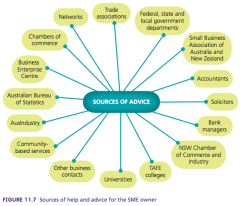![]()
![]()
![]()
Use LEFT and RIGHT arrow keys to navigate between flashcards;
Use UP and DOWN arrow keys to flip the card;
H to show hint;
A reads text to speech;
20 Cards in this Set
- Front
- Back
|
Personal Qualities (6)
|
Qualifications
Skills Motivation Entrepreneurship Cultural Background Gender |
|
|
Sources of Information
|

+ Professional Advisers and Government Agencies
|
|
|
A business idea...
|
describes the core activities of the business, and the specific features and value of the goods or services it provides.
|
|
|
A business opportunity...
|
is something an entrepreneur can see as an avenue to success.
|
|
|
Competition is...
|
rivalry among businesses that seek to satisfy a market.
SME owners must decide how to make a business competitive. |
|
|
Establishment Options (2)
|
Scratch
Purchasing existing business |
|
|
Market Considerations
|
Businesses fail without a market for their goods or service; therefore they must always undertake market analysis.
Market analysis involves collecting, summarising and analysing information about the state of the market, |
|
|
Price (4)
|
Percentage Mark-ups
Recommended Retail Price Price Leadership and Competition What The Market Will Bear |
|
|
Significance of Location
|
Different types of businesses will be suited to different locations and the business owner must consider a number of factors when determining the most appropriate location for their particular business.
|
|
|
Online Presence
|
The business is no longer limited to dealing with people who can physically visit its premises.
|
|
|
Types of Finance (2)
|
* The business owner can contribute their own funds (equity or capital), which is an internal source of funds.
* The business can also obtain loans (debt) from external sources. There are advantages and disadvantages associated with each source of finance. |
|
|
Financial Requirements
|
* The business owner must begin by listing the main expenses in setting up the business 0 establishment costs.
* The business owner then needs to estimate the running costs for a full year's operation - operating costs. * The business owner is then in a position to calculate how much finance will be needed to commence and operate the business for the first year. * One of the main reasons SMEs fail is due to cash flow problems which makes these calculations important. |
|
|
Business Name Registration
|
Business Names Act 1962
|
|
|
Zoning
|
Local government controls zoning regulations. It ensures that activities such as industry and residential are kept separate.
|
|
|
Health Regulations
|
Each local council supplies businesses with the requirement and standards to meet in order to receive a license to operate.
* A health inspector will ***** premises regularly and often without warning to ensure the business owner/operator maintains standards. |
|
|
Trade Practices
|
Trade Practices Act 1974 - protect consumers and businesses.
* Protect consumers from deceptive practices such as misleading packaging or misrepresentation of the place of promotion. * Also deals with safety and the conditions and warranties associated with products. |
|
|
Human Resources
|
One of the most important influences when establishing a SME is staffing.
If an SME owner decides to hire staff, many sources are available. The overriding recruitment objective is to attract a pool of qualified applicants with the most suitable skills. Skilled employees are more productive and create wealth for a business. On-costs are payments for non-wage benefits, including long service leave, workers compensation and annual leave loading. |
|
|
Taxation is...
|
the compulsory payment of a proportion of earnings to the government.
SME owners should structure their records and finances in such a way that they have the necessary information and money to efficiently manage their taxation obligations. |
|
|
Goods and Services Tax
|
GST is a broad-based tax of 10 per cent on the supply of most goods and services consumed in Australia. Any business with an annual turnover of $75 000 or more operating within Australia must register for the GST.
|
|
|
The Australian Business Number (ABN)
|
The ABN is a single identifying number that a business uses when dealing with government departments and agencies.
|

